As submissions flood in for Fighting Words NI’s latest zine on the theme of “Happiness,” I undertook a work experience placement there to gain more insight into the world of writing and asked the staff to expand on what happiness means to them and what it’s like to work at FWNI.
The creative writing charity was formed in 2015 due to the lack of funding and promotion of the arts and creativity in NI and the belief that schools focus on stimulating children academically at the expense of their creativity and imagination. Digital media coordinator Sam Savage said: “I like that we’re more about facilitating imagination than teaching how to write.” At Fighting Words, there’s no right or wrong answers and no idea too silly or outlandish; it’s simply a space for your creative juices to flow. In fact, the craziest ideas are celebrated: community engagement’s Niamh Scullion said, “I love the randomness of children’s ideas and the delight they have in their own and each other’s. We take the focus away from what’s right or wrong- they’re not getting marked and almost anything goes in terms of ideas.”
One thing that all staff members could agree on was the positive impacts their creative writing workshops had on both the adults in the room and the children who participated. These workshops are open to both primary and secondary schools and allow young people a space to be creative and imaginative without having to worry about achieving the perfect grades: Aoife Osborne, the volunteer coordinator, said, “It gives young people the space to be themselves; they don’t have to be writers. Staff act as their peers rather than their teachers, so it gives them a space where they don’t have to be just students. It’s fun- there’s no expectations, no word count. You just write what you want to write how you want to write it.” She also delved into the story of a moment in one of these workshops that made her feel particularly proud of the work of Fighting Words: “A child wanted a wallet character and their teacher was going to tell them they couldn’t do that, but I said, ‘Does the wallet have a name?’ I like that kids know you’re listening and taking them seriously.”
But the workshops aren’t the only activities that Fighting Words offer. The Longest Story Ever Told invites people from all around NI in pop-ups and festivals to contribute a line to an eternally ongoing story, and the Write Club cultivates a supportive atmosphere in which young people can work on their own stories or other forms of writing and give each other feedback; some members of the Write Club have already written full novels! Scriptwriting artist Emily DeDakis said: “Write Club and Playwright Club are a chance for young people who take writing really seriously and are doing it on their own to meet other people who wanna do the same thing; it’s like creating a football team for writers. Everyone talks about the lone writer and solitary artist but as a professional artist I know how important my network of colleagues is.”
One of the things I observed during my time at Fighting Words NI was the diversity of people who got involved, in terms of race, ethnicity, gender, religion (which is particularly key in NI), and even, despite my placing such emphasis on their work young writers, age. Potential writers of all ages, young and old, stopped by the headquarters for advice on printing and publishing or just to have someone listen to them read a story they’d written. General manager Talitha Taylor said, “All of our activities are geared toward social inclusion and helping people feel safe with each other and being able to feel safe in expressing themselves and their ideas. We try and promote a safe place to talk where people are listened to and feel heard, and I think since it comes from the top naturally it’ll seep into everything. I think when people walk in they can feel that atmosphere.” And that’s true, because I could certainly feel that positive atmosphere throughout the entirety of my week there.
When I asked the staff about their long-term goals for the charity, they all had a similar response to project coordinator Marnie Kennedy: “I want us to have contributed to a broad educational culture that provides children with creative experiences every day.” Fighting Words aims not just for greater creativity in school curriculums, but in fact for greater support for innovation and creative thinking across all of NI. The way that reading and writing are taught in schools can often be uninspiring and take away the spark for many children who used to love it; this was the case for FWNI’s director Hilary Copeland who got involved in the charity in the hopes of bringing back that spark for many former lovers of reading and creative writing. She said, “Later in life I found that reading as part of school and college was quite off-putting and I didn’t enjoy reading as much. I have recently rediscovered the joy that comes from reading by tapping into that feeling I experienced as a child when I couldn’t wait to turn the next page.”
On the topic of the Happiness zine, each staff member had a different, but still true, answer to the question of why they think such a theme was chosen, whether it’s due to the lack of focus on celebrating happiness within mental health awareness groups rather than just preventing sadness, or the belief that happiness doesn’t have to be massive and we can and should also take joy in the little things. This is especially true as the zine is eyeing a January 2024 release date, where it will be able to spread a little more light after the holidays, which can be a dark time for many. Emily DeDakis said: “One of my mottos is ‘Joy is not a luxury.’ I just think there is so much to be righteously and justifiably angry about right now and there are things that we can easily feel very powerless about- to see patterns repeating and vulnerable people being targeted. One of my friends was talking about how our joy is the best, most vivid proof of our survival and defiance so I think it’s really important to generate.” Submissions close on 20th November 2023, so there is still time for you to play your part in that, whether it’s through a short story, a poem, a comic strip, a script, or any other form of writing.
It has always been my view that we should all do our part to support small charities, but the arts and creative writing are sentimental to me in particular and I can’t emphasise enough the importance of the work that creative writing centres such as Fighting Words do, a belief that has only been emboldened by experiencing what it’s like behind the scenes for myself. As the Write Club continues, further zine publications are in the works, and their door in Connswater Shopping Centre remains open to anyone who might want to stop by, I implore anyone at all to get involved in such an incredible charity and not stand by as schools and governments take that passion for the arts out of our young people.
As we concluded our conversations, I finally asked each staff member what message they would like to deliver to any young writers who might be reading this. They responded with the following.
Aoife: Don’t be afraid of making mistakes.
Sam: The only bad story is one that never gets written.
Marnie: Get involved in all kinds of writing- playwriting, blogging, creating short films, the more the better. Even if people don’t have wealth or resources, everyone can have this.
Niamh: They should trust themselves. If you sit with a blank page long enough and don’t worry about it ideas will always come. There’s no pressure with writing because you can edit until you’re happy with it, so you can have fun.
Emily: Tell us. Do not ever hold back and don’t get intimidated by the word “writer.” You are that and you have important things to say, things that exist in your life and things that you imagine, so tell us.
Hilary: I would love every young person to know that writing is something that they can do and it is not reserved for any other particular person unlike them, and that their story is exactly the right story at the right time to tell.
Talitha: Just keep writing for yourself. Just enjoy the worlds that you’re creating and enjoy inhabiting them and nobody else has to see them: it’s all you and it’s a space where it’s as you as it can possibly be.

